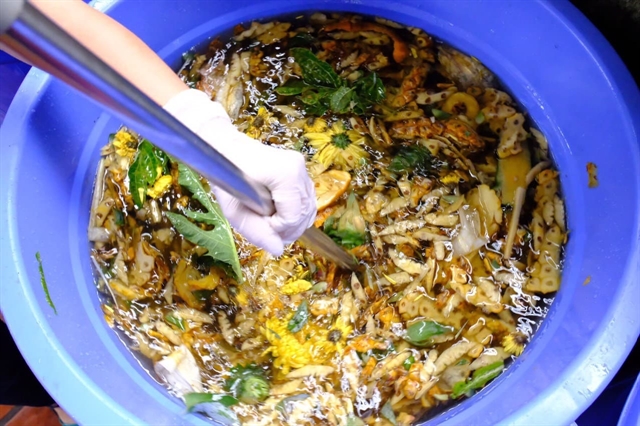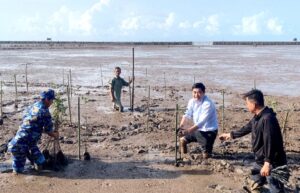They say when life gives you lemons, make lemonade. So what should you do when life gives you pineapple peels?

Pineapple peels are used to make eco-friendy enzyme cleaners. — Photo provided by Bui Thi Bich Ngoc
The answer, it seems, is to make eco-friendly enzyme cleaners, at least according to a woman in the central province of Thanh Hoa.
In her early thirties, Bui Thi Bich Ngoc wanted to do something useful for the community and get out of her comfort zone as an accountant.
Ngoc’s home province of Thanh Hoa is not only famous for beaches and fishing but also big pineapple farms in its districts of Thach Thanh, Bim Son and Ha Trung.
Pineapples are grown and processed for export or used to make pineapple juice. But what about the pineapple peel?
Ngoc said she was very concerned to see dozens of tonnes of pineapple peel being discharged into the environment daily in the province.
Part of the waste was used as cow feed while the rest was usually left abandoned, Ngoc said, adding that improperly treated peel or untreated peel posed a high risk of pollution.
Ngoc said she spent much time searching for a solution for the problem as well as how to increase the economic value of pineapples grown in her hometown.
During the search, Ngoc said, in 2017, she happened to find a study by a Thai expert on enzymes. She found that fermented fruit peels can be used to clean. The end products are friendly to the environment and good for human health.
“Pineapple peel is said to be the best input ingredient to make such bioproducts. I was so happy to know about it and thought it was a new way to add value to the pineapple grown in my home,” Ngoc said.
Since then, Ngoc started learning to make cleaning products from fruit skins including pineapple, orange, grapefruit and lemon.
“It’s both easy and difficult to make the enzyme cleaners,” Ngoc said.
She said she followed the online instructions of the Thai expert and tried at home but she struggled to increase the cleaning property of the fermented fruit peels so they could be commercial products meeting consumers’ demand.
“At that time, I knew little about biotechnology. I read all the related materials that I had.
"My husband who is quite good at English also looked for writing on enzyme cleaners and translated them into Vietnamese for me,” she said.
After reading theory, Ngoc said she tried again.
“It took dozens of failed experiment,” Ngoc said.
“Until early 2019, I was mostly satisfied with some end products and then, officially introduced them for sale with branding Fuwa3e,” she said.
“Fuwa stands for fruit warrior, implying that each enzyme is like a warrior killing bacteria and dirt in your house. 3E is enzyme, ecosystem and Earth, meaning that we made the enzyme naturally to protect the ecosystem to help create a green Earth,” Ngoc said.
Early last year, Ngoc opened Fuwa Biotech Ltd Company with products to clean floors, dishes and hands.
“All the products are made from fruit peels waste, very friendly to the environment and users,” Ngoc said.
Pineapple peels are collected from local factories that process the fruit for export or make fruit juice while other peels come from local restaurants and fruit juice stalls.
The production helped deal with some of the organic waste in the area. Moreover, Ngoc said that during fermentation, daily stirring releases O3 gas which can kill bacteria, fungi, purify the air and repel insects.
O3 gas combining with N2O, CO2 or O2 in the air can add minerals to soil and clean water sources. Final waste of the production can be used as fertiliser.
Ngoc said that they are given the peels free of charge. Ngoc said she also asked her neighbours to process and ferment the fruit peels to pitch in.
It takes three months to process and ferment the peels.
Now, Ngoc said her company provided about 10,000 products monthly to market, earning more than VND200 million. With a workshop of about 300 sq.m located at Ngoc’s house, she said she could make 60,000 products each month.
The products were certificated by HCM City Pasteur Institute as being able to remove 98 per cent of bacteria.
Ngoc said she expected to expand production and involve more local people in making cleansers from fruit peels.
“People can recycle the waste, produce environment - friendly products, earn more and lead a greener life,” Ngoc said.
Pham Giang, 35 years old, a mother of two children in Ha Noi said she started looking for organic products and those with natural origins a few years ago when she had her first child.
“I want products that are safe and good for my children and for the environment too,” she said, adding that the enzyme products were good choices.
Giang said that she had used such products to clean floors and dishes.
“They are chemical-free, biodegradable and gentle on the hands and the environment. The wastewater discharged after washing dishes is also unharmful to the environment.”
“When little children want to help parents with washing dishes, it’s wise to use eco-enzyme cleaners as it would be still okay if the children carelessly wash the dishes,” Giang suggested.
“Making and using enzyme cleaners is more and more popular as I know many housewives tried and successfully made fermented cleaners at home,” Giang said.
She said that with those advantages, she thought it was acceptable to buy eco enzyme cleaners despite them being more expensive than chemical options.
Nguyen Thu Ha, a primary teacher in Ha Noi said she knew more and more people prefer natural organic products to synthetic chemical ones because of their advantages and their good impacts on the environment.
Children should be told about them as soon as possible so when they grew up, they could make the right choices, she said.
“I feel reassured when my children use such natural products,” she said, adding that it was great if parents could make such products at home and the children could join.
Making cleaners from fruit peels sets a good example, she said.
















